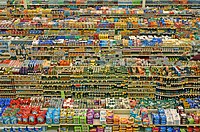Product (economics)

Products in economics are things that are made or grown and sold for money. A product can be anything from a toy to a car to a banana! When people want to buy something, they are usually willing to pay a certain amount of money for it. This is called the price of the product.
When a company creates a product, there are different costs that they have to think about. They need to pay for the materials to make the product, the machines that make it, the workers who put it together, and a whole bunch of other things too. All these costs add up and are called the production cost of the product.
Once the product is made, it is usually sold to a store or directly to customers. The store or seller wants to make a profit, so they will charge a little more for the product than the production cost. This extra money that they charge is called the markup or profit margin.
Now, when people see the product in the store or online, they can decide if they want to buy it or not. If they think the price is fair, they might buy it. If they think it is too expensive, they might decide to look for something else instead.
In summary, a product is something that is made and sold for money. Companies create products by paying for materials, workers, and machines. Stores and sellers charge a little extra for the product to make a profit. People decide whether or not to buy the product based on its price.
When a company creates a product, there are different costs that they have to think about. They need to pay for the materials to make the product, the machines that make it, the workers who put it together, and a whole bunch of other things too. All these costs add up and are called the production cost of the product.
Once the product is made, it is usually sold to a store or directly to customers. The store or seller wants to make a profit, so they will charge a little more for the product than the production cost. This extra money that they charge is called the markup or profit margin.
Now, when people see the product in the store or online, they can decide if they want to buy it or not. If they think the price is fair, they might buy it. If they think it is too expensive, they might decide to look for something else instead.
In summary, a product is something that is made and sold for money. Companies create products by paying for materials, workers, and machines. Stores and sellers charge a little extra for the product to make a profit. People decide whether or not to buy the product based on its price.
Related topics others have asked about:
